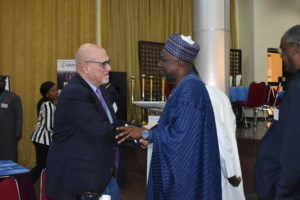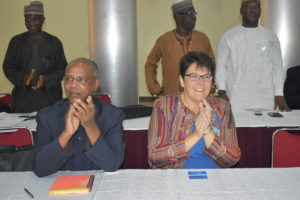Building on NEI Plus’s education gains, Nigerian state governments take larger role in the project
By Miriam MosesSeptember 20, 2018
ABUJA – Experts, advocates and the Nigerian government have set a new agenda to improve primary education in two Northern states, including state officials taking greater ownership of the activities.
During a five-day meeting in August hosted by the Northern Education Initiative Plus (NEI Plus), education experts and other participants from Bauchi and Sokoto states designed a work plan for the early grade reading project’s fourth year and discussed ways to improve and promote education in Nigeria. They were joined by experts from the United States.

Based on the plan, an additional 98,600 children will learn literacy and math skills this year in formal schools and learning centers opened in communities in need of educational interventions, bringing the total number of program beneficiaries to 600,000. State governments will assume more financial responsibilities for providing textbooks, training teachers and supporting schools to monitor teaching and learning effectively.
The NEI Plus will also continue building capacity of governments to implement education policies and standardize reading as a subject in schools.
Funded by the U.S. Agency of International Development, NEI Plus is being implemented in formal and non-formal schools in Nigeria’s Sokoto and Bauchi states, with the goal of improving reading skills for more than 1.4 million primary grade learners. The five-year project is implemented by Creative Associates International
Celebrating education gains
In his opening address at the planning meeting, representative of the Minister of Education, H.E. Adamu Adamu, said the project has helped to transform primary education in Bauchi and Sokoto states.
“In the last three years, the Initiative and the Ministry of Education have worked together to improve education in Bauchi and Sokoto states and we want to continue to sustain these gains,” he remarked.
He added that through the NEI Plus’s technical support, the Ministry of Education is building a new National Reading Framework, which it plans to scale up nationwide.
NEI Plus has already recorded gains in early grade reading in Bauchi and Sokoto states. A midline early grade reading assessment conducted by the project indicates improvement in most of the key reading skills for Hausa and English especially in second and third grades. Through the NEI Plus, up to 190,000 children in informal schools have gained literacy and numeracy skills that enabled 90 percent to mainstream into formal schools.
Preparing for continued progress
Moving forward, the government will take on an even larger ownership role in the project to sustain the gains and continue to improve education.
“We want Nigeria to graduate from USAID assistance, and in Bauchi and Sokoto states the governments need to demonstrate ownership by sustaining the project financially,” said Olawale Samuel, Education Program Management Specialist for USAID Nigeria.

To date, Sokoto state has secured 30 percent of the needed funding to sustain the program while Bauchi state has dedicated $17,000 as a monthly allocation to 20 Local Government Education Authorities in support of the monitoring and supervision of schools.
The project’s fourth year carries the theme, “The Year of the Local Government Areas and Communities,” as the state governments are now taking full ownership of the project.
Bauchi has also procured 1,000 tablets for monitoring progress, in addition to establishing a supervisory taskforce to monitor all the project schools.
As the project enters the fourth year, project staff and its government and civil society partners are working to ensure gender inclusion and better reach adolescents learners. The Initiative’s Project Director Semere Solomon pledged to scale up female representation of learning facilitators from 20 percent to 35 percent. In addition, the project formed three committees to address specific issues and challenges related to gender, sustainability and the mainstreaming of learners.
Throughout all activities, the role of the states’ local government authorities will be critical for the sustainability and expansion of the Initiative’s early grade reading program, said Solomon in his closing remarks.
“We commend Bauchi and Sokoto states for assuming ownership of the project’s key interventions in reading and non-formal education. The fourth year is critical for us and we must work together to make gains in the local governments and communities,” he said.

